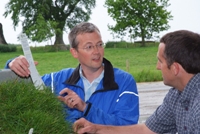Training for the future of farming

Agricultural training
23 May 2011
The Institute of Biological, Environmental and Rural Sciences (IBERS) will lead a new training programme in creating the next generation of experts to support thousands of farmers throughout the UK.
IBERS will help to train hundreds of professional and technical staff in order to develop teams of experts who will be on hand to advise farmers and the food industry taking up the latest innovations in grazing systems.
Workshops and e-learning will be used to target farm managers, agricultural suppliers’ technical staff, vets and other advisers to make sure that the flow of new technical information reaches the farmers themselves.
Theirs is one of four partnerships announced today (Monday) by the Biotechnology and Biological Sciences Research Council (BBSRC) – the four are worth a total of £12 million.
IBERS will lead a number of industrial partners as well as experts from Bangor University and the National Institute of Agricultural Botany at Cambridge.
Professor Jamie Newbold, Director of Research and Enterprise at IBERS said
“The agricultural sector is constantly evolving and this partnership features specialists that can address the lack of high level expertise in transferring scientific and technical knowledge to farmers and enabling innovation.”
Their task will be to train experts in the high-level skills needed to improve pasture farming in the UK with the aim of making beef, sheep and dairy farms more efficient whilst at the same time having less impact on the environment.
For more than 90 years, IBERS and its predecessors have been acknowledged world leaders in grassland farming and the scientists there are now using the latest genetic and biological information to develop new techniques and methods.
IBERS also specialises in transferring the latest scientific knowledge to working farmers, helping them improve their businesses and management. The new programme will take on that work.
The four new programmes will help about 100 individuals to take professional Doctorates whilst thousands more will study up to Masters level.
There was “a clear need to help the agri-food sector engage with the cutting edge of research”, said Professor Douglas Kell, Chief Executive of the BBSRC. “This will help meet the challenge of future food security by strengthening the UK industry skills base in areas such as veterinary science, animal welfare, soil science, plant breeding, crop science and food manufacture.”
IBERS is a world leader in most of these fields.



